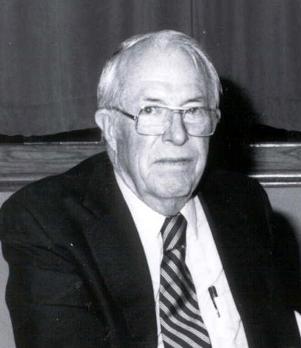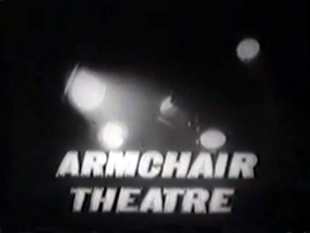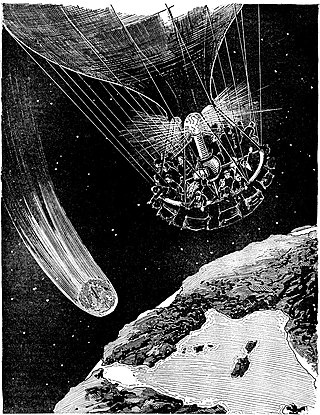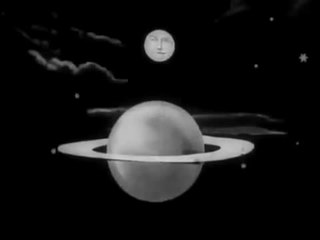Related Research Articles

Herbert George Wells was an English writer. Prolific in many genres, he wrote more than fifty novels and dozens of short stories. His non-fiction output included works of social commentary, politics, history, popular science, satire, biography, and autobiography. Wells' science fiction novels are so well regarded that he has been called the "father of science fiction".

John Wood Campbell Jr. was an American science fiction writer and editor. He was editor of Astounding Science Fiction from late 1937 until his death and was part of the Golden Age of Science Fiction. Campbell wrote super-science space opera under his own name and stories under his primary pseudonym, Don A. Stuart. Campbell also used the pen names Karl Van Kampen and Arthur McCann. His novella Who Goes There? was adapted as the films The Thing from Another World (1951), The Thing (1982), and The Thing (2011).

Terence Joseph Nation was a Welsh screenwriter and novelist. Especially known for his work in British television science fiction, he created the Daleks and Davros for Doctor Who, as well as the series Survivors and Blake's 7.

John Stewart Williamson, who wrote as Jack Williamson, was an American science fiction writer, one of several called the "Dean of Science Fiction". He is also credited with one of the first uses of the term genetic engineering. Early in his career he sometimes used the pseudonyms Will Stewart and Nils O. Sonderlund.
Mark Clifton (1906–1963) was an American science fiction writer, the co-winner of the second Hugo Award for best novel. He began publishing in May 1952 with the widely anthologized story "What Have I Done?".
Amicus Productions was a British film production company, based at Shepperton Studios, England, active between 1962 and 1977. It was founded by American producers and screenwriters Milton Subotsky and Max Rosenberg.

Thomas Nigel Kneale was a Manx screenwriter who wrote professionally for more than 50 years, was a winner of the Somerset Maugham Award, and was twice nominated for the BAFTA Award for Best British Screenplay.

Armchair Theatre is a British television drama anthology series of single plays that ran on the ITV network from 1956 to 1974. It was originally produced by ABC Weekend TV. Its successor Thames Television took over from mid-1968.

Leonard Meyer Sachs was a South African-born British actor.

Waris Hussein is a British-Indian television and film director. At the beginning of his career he was employed by the BBC as its youngest drama director. He directed early episodes of Doctor Who, including the first serial, An Unearthly Child (1963), and later directed the multiple-award-winning Thames Television serial Edward & Mrs. Simpson (1978).

Out of This World is a British science fiction anthology television series made by the ITV franchise ABC Weekend TV for ITV. It was broadcast on ITV in 1962. A spin-off from the Armchair Theatre anthology series, each episode was introduced by the actor Boris Karloff. Many of the episodes were adaptations of stories by science fiction writers including Isaac Asimov, Philip K. Dick and Clifford D. Simak. The series is described by the British Film Institute as a precursor to the BBC science fiction anthology series Out of the Unknown, which was created and produced by Out of This World creator Irene Shubik after she left ABC.

Comets have appeared in works of fiction since at least the 1830s. They primarily appear in science fiction as literal objects, but also make occasional symbolical appearances in other genres. In keeping with their traditional cultural associations as omens, they often threaten destruction to Earth. This commonly comes in the form of looming impact events, and occasionally through more novel means such as affecting Earth's atmosphere in different ways. In other stories, humans seek out and visit comets for purposes of research or resource extraction. Comets are inhabited by various forms of life ranging from microbes to vampires in different depictions, and are themselves living beings in some stories.

Walter Robert Booth was a British magician and early pioneer of British film. Collaborating with Robert W. Paul and then Charles Urban mostly on "trick" films, he pioneered techniques that led to what has been described as the first British animated film, The Hand of the Artist (1906). Booth is also notable for making the earliest film adaptation of A Christmas Carol with the silent film Scrooge, or, Marley's Ghost (1901).

The '?' Motorist is a 1906 British silent comedy trick film, commonly called "The Mad Motorist" or "Questionmark Motorist" and directed by Walter R. Booth. Released in October 1906, the film is "one of the last films that W.R. Booth made for the producer-inventor R.W. Paul," and, according to Michael Brooke of BFI Screenonline, "looks forward to the more elaborate fantasies that Booth would make for Charles Urban between 1907 and 1911, as well as drawing on a wide range of the visual tricks that Booth had developed over the preceding half-decade."

Comet was a pulp magazine which published five issues from December 1940 to July 1941. It was edited by F. Orlin Tremaine, who had edited Astounding Stories, one of the leaders of the science fiction magazine field, for several years in the mid-1930s. Tremaine paid one cent per word, which was higher than some of the competing magazines, but the publisher, H-K Publications based in Springfield, MA, was unable to sustain the magazine while it gained circulation, and it was cancelled after less than a year when Tremaine resigned. Comet published fiction by several well-known and popular writers, including E.E. Smith and Robert Moore Williams. The young Isaac Asimov, visiting Tremaine in Comet's offices, was alarmed when Tremaine asserted that anyone who gave stories to competing magazines for no pay should be blacklisted; Asimov promptly insisted that Donald Wollheim, to whom he had given a free story, should make him a token payment so he could say he had been paid.
The year 1901 was marked, in science fiction, by the following events.
The year 1907 was marked, in science fiction, by the following events.
The year 1915 was marked, in science fiction, by the following events.
The year 1920 was marked, in science fiction, by the following events.
The year 1929 was marked, in science fiction, by the following events.
References
- ↑ "Clifton, Mark 1906-1963". Worldcat. Retrieved 20 July 2018.
- ↑ Heritage Rare Books & Manuscripts Auction Final Session # 683. Heritage Capital Corporation. p. 79. ISBN 9781599672595.
- ↑ "In the Days of the Comet by H.G. Wells". Barnes & Noble. Retrieved 20 July 2018.
- ↑ "BFI Screenonline: '?' Motorist, The (1906)". www.screenonline.org.uk. Retrieved 20 July 2018.
- ↑ Clegg, Brian (2014). Final Frontier: The Pioneering Science and Technology of Exploring the Universe. St. Martin's Press. p. 27. ISBN 9781250039446.